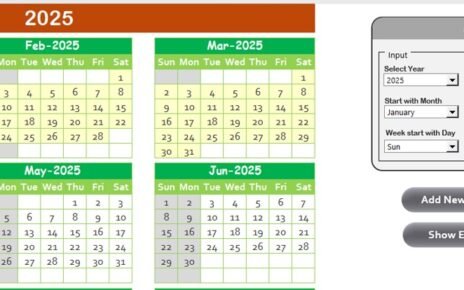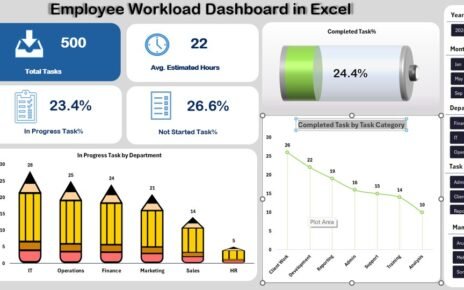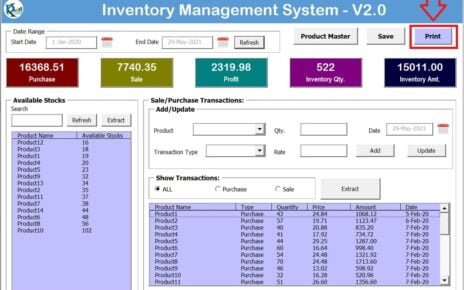The hospitality industry grows every day, and the expectations of guests rise even faster. Hotels and resorts must track their performance closely if they want to stay ahead. Room occupancy, guest satisfaction, food and beverage revenue, and service quality metrics play an important role in the success of any hospitality business. However, many hotel teams struggle with scattered data, manual reporting, and delayed insights.
Click to buy Hospitality & Resorts KPI Dashboard in Power BI
To solve this challenge, the Hospitality & Resorts KPI Dashboard in Power BI offers a complete visual reporting system. It brings all important KPIs into a single, interactive dashboard so managers can take action without wasting time. You can monitor performance, compare actual numbers with targets, and make quick decisions that improve operational efficiency.
This article explains everything about this dashboard. You will learn how it works, why it matters, its key features, and the best ways to use it. You will also see the advantages, best practices, and answers to common questions to help you use it confidently.
What Is a Hospitality & Resorts KPI Dashboard in Power BI?
A Hospitality & Resorts KPI Dashboard in Power BI is a visual reporting tool that tracks and displays performance indicators across hotel and resort operations. It gives you real-time insights into occupancy rates, revenue, operating costs, guest satisfaction, service quality, housekeeping performance, and more. Power BI connects with an Excel file, reads the numbers, and updates all charts and tables automatically.
This dashboard helps hospitality teams:
- Track Month-to-Date (MTD) and Year-to-Date (YTD) performance
- Compare actual values with targets
- Identify improvement areas
- Understand trends in operations
- Monitor performance against previous year
- Make faster, data-driven decisions
Because the dashboard uses Excel as a data source, even non-technical teams can use it. You only need to update the Excel sheets, and Power BI will refresh the complete view with a single click.
Why Do Hotels and Resorts Need KPI Dashboards?
Hotels and resorts manage many activities at once. Because each activity affects the guest experience, it becomes difficult to track everything manually. A KPI dashboard solves this problem by bringing all performance indicators into one visual space. Managers can check daily operations, financial health, and service standards without searching through multiple reports.
Some common challenges hotels face:
- Manual reporting takes too much time
- Data gets scattered across departments
- Teams do not have a clear picture of current performance
- Decision-making becomes slow
- Targets and achievements remain unclear
The Hospitality & Resorts KPI Dashboard in Power BI solves these issues by showing all numbers in an organized format. It also highlights gaps, opportunities, and performance trends that help managers act on time.
Key Pages of the Hospitality & Resorts KPI Dashboard in Power BI
This dashboard contains three well-structured pages:
Summary Page – The Main Control Center
The Summary Page is the most important section of the dashboard. It provides a snapshot of all KPIs in a simple, interactive layout. The Month and KPI Group slicers help users filter the dashboard quickly.
What You See on the Summary Page:
- Month Slicer
- KPI Group Slicer
- Cards showing:
- Total KPIs Count
- MTD Target Met
- MTD Target Missed
Below the cards, you get a detailed table with essential information such as:
- KPI Number
- KPI Group
- KPI Name
- Unit of Measurement
- KPI Type (LTB or UTB)
- Actual CY MTD
- Target CY MTD
- MTD Icon (Green ▲ or Red ▼)
- Target vs Actual MTD
- Previous Year MTD (PY MTD)
- CY vs PY MTD
- Actual CY YTD
- Target CY YTD
- YTD Icon (Green ▲ or Red ▼)
- Target vs Actual YTD
- PY YTD
- CY vs PY YTD
These fields help managers track both short-term and long-term performance.

Click to buy Hospitality & Resorts KPI Dashboard in Power BI
KPI Trend Page – Visual Trends at a Glance
This page shows performance trends for MTD and YTD values.
What You See on This Page:
- Two combo charts
- Actual Values (CY)
- Targets
- Previous Year Values
- A slicer to choose the KPI Name
These trend charts help managers understand seasonal patterns, improvements, and drops in performance. Because hotels work with dynamic demand, trend analysis becomes important for planning and forecasting.

Click to buy Hospitality & Resorts KPI Dashboard in Power BI
KPI Definition Page – Detailed Formula View
This page is hidden and works as a drill-through page. When users click on any KPI from the Summary Page, they can see details like:
- KPI Group
- KPI Name
- Unit
- Formula
- Definition
- Type (LTB or UTB)
This feature helps managers understand how each KPI is calculated. It also maintains transparency across operations.

Click to buy Hospitality & Resorts KPI Dashboard in Power BI
How the Excel Data Source Works
The dashboard uses an Excel file as the main data source. It contains three required worksheets:
Input_Actual Sheet
You fill:
- KPI Name
- Month (First date of the month)
- MTD Actual
- YTD Actual
This sheet holds the actual performance data.
Input_Target Sheet
You enter:
- KPI Name
- Month
- MTD Target
- YTD Target
This sheet helps Power BI compare actual numbers with targets.
KPI Definition Sheet
This sheet includes:
- KPI Number
- KPI Group
- KPI Name
- Unit
- Formula
- KPI Definition
- Type (LTB or UTB)
This sheet powers the drill-through page.

Advantages of Using a Hospitality & Resorts KPI Dashboard in Power BI
A well-designed dashboard brings many benefits. Here are some of the most valuable advantages:
- Faster Decision-Making
Managers get instant visibility into performance. Because the dashboard updates automatically, leaders can act without delays.
- Better Guest Experience
Hotels and resorts can monitor service quality metrics and improve operations quickly.
- Clear Monthly and Yearly Tracking
MTD and YTD values give a complete picture of short-term and long-term achievements.
- Easy Excel-Based Updates
Even non-technical users can update data with confidence.
- Strong Visual Communication
Icons, colors, and charts make it easy to understand performance at a glance.
- Improved Accountability
Each department can check its KPIs and take ownership.
- Accurate Target Comparison
The dashboard highlights where performance meets or misses targets.
- Data-Driven Strategy
The trend charts help managers plan better and adjust strategies based on real numbers.
Best Practices for Using the Hospitality & Resorts KPI Dashboard
To get maximum value from this dashboard, follow these simple best practices:
- Update Data Regularly
Refresh your Excel sheets every month to maintain accuracy.
- Use KPI Groups Effectively
Organize KPIs by categories such as Operations, Finance, Food & Beverage, Housekeeping, and Customer Satisfaction.
- Review Trends Frequently
Check the KPI Trend page every week to understand demand patterns.
- Set Realistic Targets
Use previous year data to set achievable targets.
- Check Icons and Colors Carefully
The green and red indicators help you understand performance instantly.
- Use Drill-Through Wisely
Open the KPI Definition page when you need deeper insights.
- Share the Dashboard with Teams
Encourage department heads to check their KPIs regularly.
- Keep Definitions Clear
Update the KPI Definition sheet whenever a formula changes.
Conclusion
The Hospitality & Resorts KPI Dashboard in Power BI simplifies performance tracking for hotels and resorts. It offers a clear, organized, and data-driven view of operations. With MTD and YTD tracking, trend charts, and drill-through capabilities, managers can make faster decisions and improve guest experiences. The Excel-based data entry system ensures flexibility, accuracy, and ease of use.
This dashboard is a powerful tool for hospitality businesses that want a smarter way to monitor performance and grow confidently.
Frequently Asked Questions (FAQs)
- Do I need technical skills to use this dashboard?
No, you only need basic Excel knowledge. Power BI handles all visuals automatically.
- Can I customize the KPIs?
Yes, you can add or remove KPIs from the KPI Definition sheet.
- Does the dashboard support monthly analysis?
Yes, it supports MTD, YTD, and previous year comparisons.
- Can I use this dashboard for multiple properties?
Yes, you can add property names as a slicer and extend the data structure.
- How do I refresh the dashboard?
Update your Excel file and click the refresh button in Power BI.
- Does the dashboard show trend charts?
Yes, the KPI Trend page includes two combo charts for MTD and YTD.
Visit our YouTube channel to learn step-by-step video tutorials
Watch the step-by-step video tutorial:
Click to buy Hospitality & Resorts KPI Dashboard in Power BI



